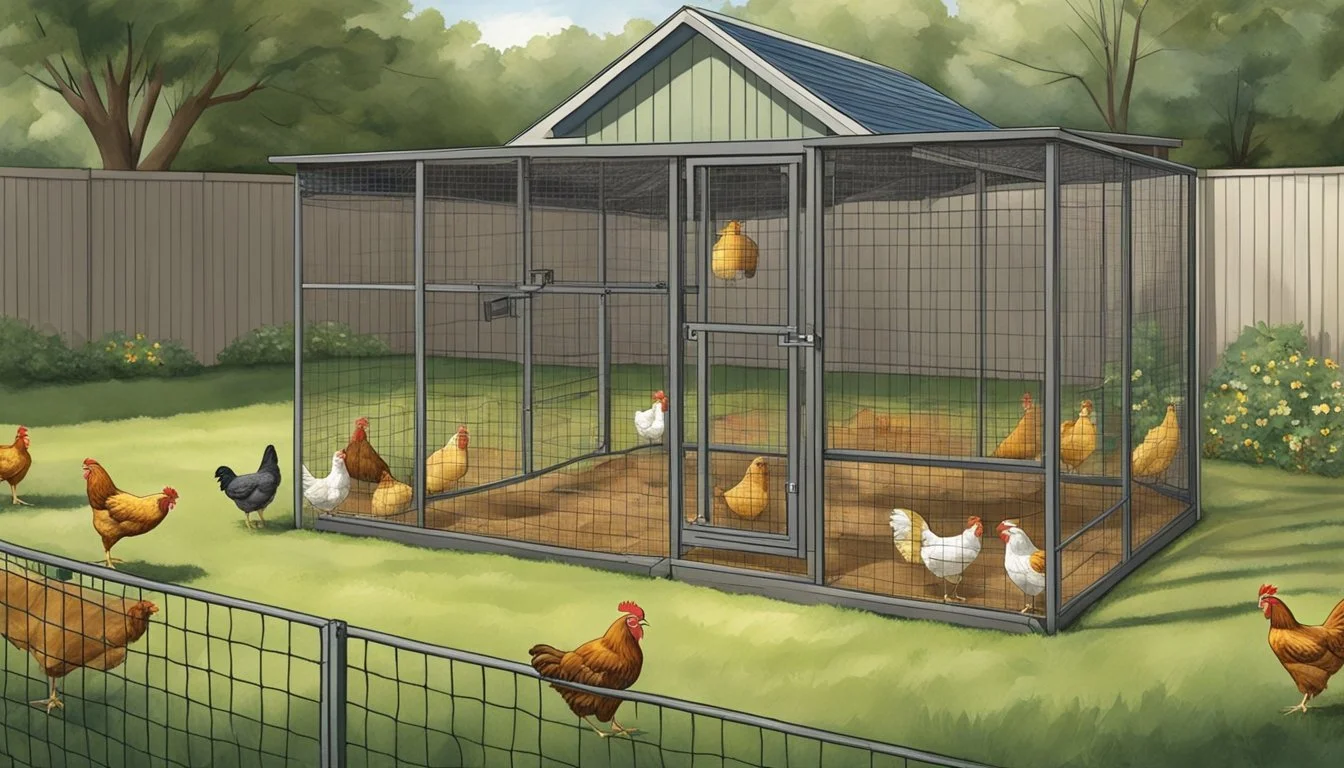Raising Backyard Chickens in Dothan, AL
A Starter Guide for Urban Poultry Farmers
Raising backyard chickens has grown in popularity among residents seeking a sustainable lifestyle or simply looking to enjoy the benefits of fresh eggs. In Dothan, Alabama, this trend has found a community of engaged enthusiasts. The city's climate and culture provide favorable conditions for poultry husbandry, but potential chicken keepers must navigate specific legal requirements and considerations to ensure their venture complies with local ordinances.
Individuals in Dothan considering the addition of chickens to their backyard must be aware of the city's rules and regulations. It is required that residents obtain approval from all adjoining property owners, expressing consent for the keeping of chickens. Although this stipulation is not explicitly mentioned in the city ordinances, it is enforced with vigor, demonstrating the city's commitment to maintaining harmony among residents. Furthermore, keeping chickens isn't simply a matter of legal compliance; it also involves understanding and providing for the animals' welfare, including considerations for the local climate and choosing suitable breeds that can thrive in Dothan's conditions.
Understanding Local Ordinances in Dothan
In Dothan, Alabama, residents interested in raising backyard chickens must comply with specific local ordinances. Ensuring adherence to these regulations is crucial for the responsible keeping of chickens within the city limits.
Permit Requirements
Residents of Dothan must obtain a permit before they can legally own backyard chickens. Key to this process is acquiring signatures from every adjoining property owner, indicating their consent for the individual to keep chickens. This is an enforcement practice, though not explicitly stated within the city ordinances.
Rooster Regulations
Local ordinances in Dothan are particular when it comes to roosters. While the city allows the keeping of chickens, the inclusion of roosters within backyard flocks is typically restricted due to the noise they generate. It's advisable to check the latest provisions under Chapter 10 of the city ordinances, which cover regulations about animals or fowl, for current rules regarding roosters.
Enclosure and Shelter Standards
For those keeping chickens, the City of Dothan enforces standards for enclosures and shelters. These regulations are designed to provide safe and humane living conditions for the chickens while also considering the local community and environment:
Enclosures must be kept clean and free from offensive odors.
They must also provide adequate space for the number of chickens being kept.
Shelters should protect chickens from weather elements and potential predators.
It's important for prospective and current chicken owners to stay informed of any updates to local laws concerning the keeping of backyard chickens in Dothan, AL.
Choosing the Right Chickens
When selecting chickens for a backyard setting in Dothan, Alabama, it is crucial to consider the local climate, space constraints, and the desired purpose of raising chickens, whether for egg production, meat, or companionship.
Selecting Breeds
For Dothan's climate, breeds that can tolerate both heat and occasional cold are essential. Rhode Island Reds and Plymouth Rocks are excellent choices for their hardiness and consistent egg production.
Rhode Island Reds: Ideal for their adaptability and egg-laying consistency.
Plymouth Rocks: Known for their docile nature and suitability to varying temperatures.
Acquiring Chicks or Adult Birds
Prospective chicken keepers can buy chicks or adult birds. Chicks require more care initially but allow for more control over their upbringing. Adult birds, however, are better for those looking for immediate egg production. Here are two primary options:
Local Feed Stores: They often sell chicks, especially during the spring.
Reputable Breeders: They can provide vaccinated and sexed birds.
Considerations for Companionship
Chickens are social creatures, so keeping multiple birds is recommended for their well-being. A minimum of three chickens allows for social interactions and companionship, reducing stress and promoting health. Remember that hens tend to be quieter and less disruptive than roosters, which is a consideration in urban areas like Dothan.
Creating a Comfortable Coop
When constructing a chicken coop in Dothan, AL, attention to detail ensures the well-being and productivity of the backyard flock. This section will cover the essential features a coop should have, focusing on ventilation, insulation, and appropriate space for nesting.
Essential Coop Features
The foundation of a secure chicken coop includes sturdy construction materials that can withstand Dothan's weather and predator-proofing to keep the flock safe. Chicken wire or hardware cloth is a must to protect against predators, and a lockable door is essential for securing the coop at night. Roosters and hens require a raised area, or roosts, for sleeping, so install these at least two feet off the ground.
Ventilation and Insulation
Adequate ventilation is vital for the flock's health, particularly during Dothan’s hot summers. Strategically placed vents or windows ensure air circulation without causing drafts in cooler months. In addition, insulation under the roofing can help regulate the coop's temperature year-round, making it cooler in summer and warmer in winter, which is crucial for a chicken's health and laying capability.
Nesting Boxes and Space
For egg-laying chickens, nesting boxes are a non-negotiable. One nesting box measuring at least 12x12x12 inches for every four to five hens is recommended. Line these with straw or wood shavings for comfort. Chickens require at least 2-3 square feet of space inside the coop and 8-10 square feet in an outside run. Remember, more space helps prevent stress, overcrowding, and potential pecking problems.
Chicken Care and Management
Raising backyard chickens in Dothan, Alabama, requires a solid understanding of daily feeding routines, vigilant health monitoring, and an awareness of the flock's social dynamics. Adhering to the best practices in these areas ensures the well-being of the chickens.
Daily Feeding Routines
Proper nutrition is fundamental for healthy chickens. Chick starter feed should be provided for the first 8 weeks, comprising 18-20% protein. Transitioning to a starter/grower feed from 8-14 weeks with 16-18% protein is next, followed by a 16% protein finisher until 18 weeks. Adult chickens benefit from a balanced layer feed. Feeders should be checked and refilled daily to maintain a consistent feeding schedule.
0-8 weeks: 18-20% protein starter feed
8-14 weeks: 16-18% protein starter/grower
15-18 weeks: 16% protein finisher
Adults: Layer feed
Health Monitoring and Handling
Chickens require regular health checks to prevent the spread of illness. Signs of ill health include changes in behavior or appetite, abnormal droppings, respiratory issues, and lethargy. Safe handling involves supporting the chicken's body and inhibiting wing flapping to reduce stress. Routine handling helps familiarize the birds with human contact, making health assessments easier.
Signs of Health Concerns:
Behavioral changes
Abnormal droppings
Respiratory distress
Lethargy
Handling Tips:
Support the body
Restrain the wings gently
Handle regularly for ease of health checks
Understanding the Pecking Order
The pecking order is a social hierarchy that establishes dominance within a flock. Recognizing and respecting this structure is crucial for flock harmony. Introducing new chickens should be done cautiously to prevent disruption. Signs of aggression or bullying require careful management to ensure the well-being of all birds.
Observe interactions
Introduce new birds carefully
Manage aggression to maintain harmony
Protecting Your Flock
When raising backyard chickens in Dothan, AL, safeguarding them from local predators is vital for their well-being. Strategic and sturdy enclosures play a crucial role in preventing attacks.
Common Predators in Dothan
Dothan, Alabama, has a variety of predators that could pose a threat to backyard chickens. These include:
Mammalian Predators: Raccoons, minks, and weasels are adept at finding ways into chicken coops, especially at night.
Birds of Prey: Hawks, owls, and eagles can attack during the day, with hawks being the most common assailants.
Reptilian Threats: Snakes can be a concern, primarily for eggs and young chicks.
Preventive Measures
Effective enclosures are essential to protect poultry. Homeowners should adhere to the following guidelines:
Fortify the Coop: Ensure the coop is secure with no holes larger than a quarter.
Locking Mechanisms: Install locks on windows and doors that predators cannot open.
Electric Fencing: Consider using electric fencing around the run to deter climbing predators like raccoons.
Regular Inspections: Regularly check the integrity of the coop and the surrounding enclosure to identify and repair potential weak spots.
Egg Production and Usage
The pursuit of egg production in backyard poultry involves meticulous care and a strategic approach to ensure a steady supply of fresh eggs. Proper management and understanding of the chickens' needs are central to achieving maximum yield and enjoying the benefits of fresh eggs.
Maximizing Egg Production
To maximize egg production, owners should concentrate on creating a comfortable environment for their chickens. A well-ventilated, clean, and draft-free coop is vital. One should maintain a consistent temperature within the coop to minimize stress on the birds, as stress can lead to a decrease in egg laying. Additionally, it’s crucial to provide a nesting box for every three to four hens to ensure that they have a safe and secluded space for laying eggs.
Regular feed and a consistent laying routine also contribute significantly to egg production. The following elements are essential for a high-yield flock:
Ample sunlight: Chickens need about 14-16 hours of light per day to maintain optimum egg production.
Nutrition: A diet high in calcium and protein helps in producing strong eggshells and healthy hens.
Age of the Flock: Younger hens lay more frequently, but as they age, the number and quality of eggs may decline.
Benefits of Fresh Eggs
Fresh eggs from one's own backyard chickens have numerous benefits over their store-bought counterparts:
Nutritional Value: They are often more nutrient-dense, with a higher content of vitamins and omega-3 fatty acids.
Taste: Many people find the flavor of fresh eggs to be superior. They are known for their rich, robust taste.
Food Miles: Backyard eggs have virtually no food miles, making them an environmentally friendly choice.
In Dothan, AL, individuals keen on producing their own eggs should be aware of local ordinances, which may include requiring permissions from adjoining property owners. Adherence to these regulations is necessary for the legal raising of backyard chickens and the enjoyment of their fresh eggs.
Considerations for Free-Range Chickens
When planning to raise free-range chickens in Dothan, AL, it is essential to consider how much space is required for optimal well-being and to be mindful of local regulations.
The Benefits of Free-Range
Space Requirements:
For free-range chickens, adequate space is crucial. Each chicken requires at least 15 square feet of outdoor space. This ensures they have enough room to forage, which is beneficial for their diet and exercise, leading to healthier birds and higher quality produce.
Natural Behaviors:
Chickens in a free-range environment can engage in natural behaviors such as foraging for insects, worms, and plants. They tend to experience less stress and exhibit behaviors indicative of happiness and contentment.
Healthier Produce:
Free-range conditions often result in healthier eggs and meat due to the chickens' access to a varied diet and more exercise.
Environmental Enrichment:
A free-range setup should provide an environment that keeps the chickens engaged, happy, and healthy. It includes features like dust baths, perches, and areas for scratching and pecking.
Remember, while there are considerable advantages to free-ranging your chickens, it is also necessary to adhere to the specific requirements and regulations set forth by the city of Dothan, AL.
Addressing Common Challenges
When raising backyard chickens in Dothan, Alabama, it’s important to tackle a few common challenges that come with poultry ownership. Effective strategies can mitigate messy behavior, noise, odor, and waste management issues.
Dealing with Messy Behavior
Chickens are naturally inclined to forage, which involves pecking and scratching at the ground. This can lead to scattered feed and damage to lawns and gardens. To minimize mess:
Provide a designated foraging area: Encourage chickens to focus their foraging in a specific part of the yard to contain the disruption.
Use feeders: Elevated or treadle feeders help to keep feed contained and reduce spillage.
Handling Noise and Odor
Noise and odor can be a concern for chicken keepers in urban and suburban settings. It is essential to address these issues to maintain good relationships with neighbors:
Select quieter breeds: Some chicken breeds are less vocal than others. Consider breeds known for being quieter.
Clean regularly: Timely coop cleaning reduces odor. A cleaning schedule should include:
Frequency Task Daily Remove wet or soiled bedding. Weekly Change litter and check for cleanliness. Monthly Thorough coop cleaning and inspection.
Managing Chicken Waste
Chicken waste should be managed not only to prevent odor but also to maintain a healthy environment:
Compost chicken manure: Chicken waste can be a valuable addition to compost, turning it into fertilizer for gardens.
Proper disposal: Ensure that chicken waste does not accumulate. If not used in compost, it should be disposed of in accordance with local regulations.
By diligently addressing these challenges, chicken keepers in Dothan can enjoy the rewards of raising chickens while maintaining a clean and neighbor-friendly environment.
The Broader Impact of Backyard Chickens
Backyard chickens provide substantial benefits to local farming and foster a sense of community among poultry enthusiasts. In Dothan, Alabama, these impacts are seen in the contribution chickens provide to the local food system and in the way they bring residents together.
Contribution to Local Farming
In Dothan, the presence of backyard chickens bolsters local farming by adding to the diversity of produce and promoting sustainable living. The chickens contribute not only eggs but also manure, which can be used to enrich the soil in gardens and farms. This leads to a healthier local ecosystem and a reduced carbon footprint, as transportation of food products from distant farms is lessened. Additionally, backyard chickens often feed on pests and food scraps, aiding in waste reduction.
Benefits to soil: Use of chicken manure for fertilization
Reduction in waste: Chickens consume kitchen scraps and pests
Local food contribution: Fresh, locally-sourced eggs
Building a Community of Chicken Enthusiasts
Backyard chickens have a unique role in creating a community of like-minded individuals in Dothan. They provide a common interest that brings neighbors together, encouraging the exchange of tips, coop designs, and even chicken-related events. Poultry clubs and online forums typically sprout from these interests, reinforcing the sense of community.
Exchange of knowledge: Sharing of care techniques and experiences
Social functions: Events such as coop tours and chicken-keeping classes
Online and in-person networks: Forums and local clubs for chicken enthusiasts
By impacting local farming and building a supportive community, backyard chickens have a positive effect on the broader urban fabric of Dothan.
Preparation and Shipping of Eggs and Chickens
When raising backyard chickens in Dothan, Alabama, a crucial aspect to consider is the safe preparation and transport of eggs and live chickens. Both require specific packaging methods to ensure they reach their destination without harm.
Packaging Eggs for Shipping
To ship eggs, one must carefully protect them from damage during transit. The eggs should first be placed inside a carton, which is then wrapped in multiple layers of bubble wrap for cushioning. After taping one end of the priority shipping box, a layer of crumpled newspaper should line the bottom to absorb any shocks. The carton is placed upright in the box, and more newspaper is packed tightly around all four sides.
Steps for packaging eggs:
Place eggs in a carton.
Wrap the carton in bubble wrap.
Line a shipping box with crumpled newspaper.
Place the carton upright in the box.
Fill remaining spaces with newspaper for a snug fit.
Transporting Live Chickens Safely
For transporting live chickens, one's focus should be on the birds' safety and comfort. Chickens should be placed in sturdy, ventilated carriers with enough space to stand and turn around. The carriers should be kept in a temperature-controlled environment to prevent stress due to heat or cold. It is crucial to ensure easy access to water and to plan for regular stops to check on their well-being during the journey.
Conclusion
In Dothan, Alabama, the interest in backyard chicken keeping demonstrates a shift towards sustainability and self-sufficiency. Residents must navigate local ordinances, which necessitate permissions from adjoining property owners. Potential chicken keepers should contact the Dothan City Clerk at (334) 615-3161 for detailed regulations.
The benefits of this practice encompass fresh egg production and the joy of animal husbandry. Nevertheless, the commitment involves expenses for chicks, coop construction, and feed. A coop can cost $200 - $1,000, while a 50 lb. bag of feed is approximately $16.
For those concerned with urban chicken keeping or seeking more information, reaching out to the Dothan Department of Planning and Development at (615) 4410 is advisable.
Residents are encouraged to weigh the initial investment against long-term gains, ensuring their endeavors align with local requirements and community standards. They should consider the sustainability aspect and their aptitude for animal care in their deliberation.
In summary:
Check local ordinances: Secure necessary permissions.
Initial investment: Anticipate costs for chicks, coop, and feed.
Contact for concerns: The city's Planning and Development Department.
Evaluate benefits: Fresh eggs, sustainability, and animal companionship.
Raising chickens in Dothan provides residents with both challenges and rewards, promoting a closer connection to their food source and nature.











